by Greg Barron
There was movement at the station, for the word had passed around
That the colt from old Regret had got away
And had joined the wild bush horses – he was worth a thousand pound,
So all the cracks had gathered to the fray.
All the tried and noted riders from the stations near and far
Had mustered at the homestead overnight,
For the bushmen love hard riding where the wild bush horses are,
And the stock-horse snuffs the battle with delight.
These words from Banjo Patterson’s The Man from Snowy River are etched in the national psyche. They sum up our view of ourselves as wild and free, summoning images or mountain peaks and vast open spaces, and take us to a place where courage is the most admirable quality and heroes save the day.
Bush poetry is sometimes dismissed as irrelevant or even cringeworthy by certain parts of Australia’s population, and embraced as the true spirit of our nation by others. The truth, however, is that even the most urban and cosmopolitan segments of our modern society can learn from the truths our bush poets shaped into verse.
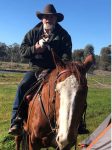
The original bush poets were Indigenous story tellers. Their words were spoken or sung, often chants set to the rhythm of clapsticks and accompanied by the didgeridoo. Their songs celebrated dream time stories, the hunting of game species, or encouraged certain crops to grow. There are also anecdotal stories of Aboriginal ‘clever men’ attempting to ‘sing’ white men’s bullets into water, to make them fall to the ground without harming anyone. In any case, for hundreds of generations, stories were and still are passed down through spoken word; vital information pathways for the many, many different cultures that made up Indigenous Australia.
The first men and women to earn the title “bush poets” were not born here. There was a certain breed of Englishman and woman who took to the Australian bush like ducks to water. They found joy in the relative freedoms and new traditions of this land. Some were educated readers of traditional English poetry, others more instinctive. One or two were quite political, tied to chartist or anarchist beliefs. They came from different classes, some being minor aristocrats and others being share-croppers and labourers.
Adam Lindsay Gordon was one of the first to make his mark as a poet. A feature of the bush poetry genre is that the poet needs to have lived the bush life and this he did, immigrating at the age of twenty, then joining the South Australian police force, where he travelled the outback extensively. He also pursued his love of horse riding. His 1870 collection, Bush Ballads and Galloping Rhymes, is arguably his best.
Let me slumber in the hollow where the wattle blossoms wave
With never stone or rail to fence my bed
Should the sturdy station children pull the bush flowers on my grave
I may chance to hear them romping overhead.
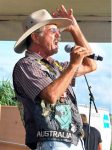
Will Ogilvie was a Scot who spent only twelve years in Australia, yet he wrote some of our most inspiring verses. One favourite, for generations of ringers, cattle duffers and drovers has been, “The Man Who Steadies the Lead.”
He was born in the light of red oaths
And nursed by the drought and the flood,
And swaddled in sweat-lined saddle-cloths
And christened in spur-drawn blood;
He never was burdened with learning,
And many would think him a fool,
But he’s mastered a method of “turning”
That never was taught in a school.
His manners are rugged and vulgar,
But he’s nuggets of gold in our need,
And a lightning flash in the mulga
Is the man who steadies the lead.
Mary Hannay-Foott was born in Scotland, but married a stock inspector in the outback town of Bourke, and gave us the beautiful, Where the Pelican builds her nest.
The horses were ready, the rails were down,
But the riders lingered still, —
One had a parting word to say,
And one had his pipe to fill.
Then they mounted, one with a granted prayer,
And one with a grief unguessed.
“We are going,” they said, as they rode away —
“Where the pelican builds her nest!”
The most famous bush poets were Australian born. Henry Lawson and “Banjo” Patterson are the undisputed kings of the genre. Their writings epitomise two schools of thought on the Australian bush: the romantic writings of Banjo Patterson, and the harder, more brutal outback of Henry Lawson.
Either way, Australian born poets were driven by an awareness of their own uniqueness. The Australian bush was tough, and this engendered a certain pride in those who could thrive in it.
Charles Harpur delved deeply into the vagaries of the Australian bush, also producing a five-act play called The Bushrangers. Henry Kendall was a native-born poet. He died of Tuberculosis at just 43 years of age, but not before he had written the poignant, The Last of his Tribe, and the unforgettable Bell Birds.
By channels of coolness the echoes are calling,
And down the dim gorges I hear the creek falling;
It lives in the mountain, where moss and the sedges
Touch with their beauty the banks and the ledges:
Through breaks of the cedar and sycamore bowers
Struggles the light that is love to the flowers,
And softer than slumber, and sweeter than singing,
The notes of the bell-birds are running and ringing.
The poet who presented the bush in the harshest light of all was stockman and poet Barcroft Boake. Trained as a surveyor, he spent years in the back-blocks of New South Wales, connecting with the Western landscape. Before long he had quit the Survey Department and was off droving in Queensland. At the same time he devoured the poetry of Adam Lindsay Gordon, and developed the urge to express the tough love he felt for the bush. He started writing, and by 1890 his poems were appearing regularly in the Bulletin magazine.
His career as a poet was short-lived. When he was just twenty-four years of age he was called back to Sydney where his family was facing bankruptcy. Barcroft fruitlessly searched for work, battling depression and anxiety. His body was found under a tree on the shores of Sydney Harbour in May 1892, hanging from his own stockwhip.
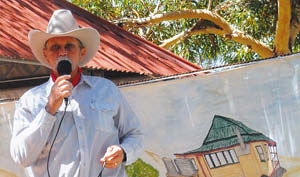
Out on the wastes of the Never Never –
That’s where the dead men lie!
There where the heat-waves dance forever –
That’s where the dead men lie!
That’s where the Earth’s loved sons are keeping
Endless tryst: not the west wind sweeping
Feverish pinions can wake their sleeping –
Out where the dead men lie!
Dorothea Mackellar wrote the iconic My Country when she was just nineteen years old, while journeying with her family in England. Born in Sydney but raised in the Hunter Valley, she missed her wide brown land and its “beauties and terrors.” My Country, is probably Australia’s most frequently quoted poem.
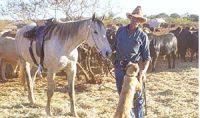
Contemporary Bush Poets
Urban dwellers would be surprised by how often, around a fire, or after dinner at a station kitchen table, someone will pull from their top pocket a few folded sheets of dog-eared and ink-stained paper. A cough then, “I wrote down a few verses the other day. Anyone want to hear them?”
These are the amateurs, but Australia still has a bunch of dedicated bush poets. Some live the life of Grey Nomads, with signs on their caravans, selling self-published collections and offering free readings in camp kitchens and around fires in cut-off 44-gallon drums. Others work on stations and farms, sharing their work via social media.
Billy Ruth, for example, has been writing bush poetry for most of his life. “My grandfather was the main reason I got into writing bush poetry when I was a young fella. He was a self-taught school teacher and I just naturally started writing when I was about ten years old. Social media is my main way of getting my poetry out there. I’ve had people suggest a book but so far haven’t managed it.”
Corin Linch tells me that he was inspired by a lifelong love of horses, and the poetry he first learned about in school as his big influences. Lawson’s Ballad of the Drover, and John O’Brien’s Said Hanrahan were standouts. He also notes that “Being mad keen on horses back then (still am), who wouldn’t be inspired by the Man from Snowy River?” After school, working on cattle stations such as Moola Bulla near Halls Creek, he started to broaden his interest, reading the work of Patterson and Will Ogilvie. Around this time he started writing his own verses, usually on scraps of paper that eventually were lost.
“Some years later I was in the Pilbara area cattle mustering, and I’d wake early, around three am, a habit from my stock days. I’d listen to the radio while smoking too many cigarettes and drinking too much coffee. The only station I could pick up was the ABC and the early morning show used to go state wide until six am. One morning I rang and asked if they were interested in a bit of bush poetry. Before too long I was doing readings once a week and listeners asked if I had a book out.”
With four self-published collections of poetry under his belt Corin is still living the life, and still writing.
Bob Pacey is a bush poet who sees himself as a performer above all else. According to his bio: “In full flow he can make a grown man cry at ten paces. And such is his versatility that those tears might be of laughter or despair.”
Bob credits his aunt with sparking his interest in poetry, “When my dad passed away in 1997 I got to see a lot more of my Auntie Pat Pacey, who herself was an accomplished writer. She told me that my mum who passed away when I was sixteen wrote poetry and my grandmother was very good at limericks. She encouraged me to have a go which I did and first up I used old jokes and turned them into poems.
“She was the one who pushed me and I started sending poems into the local paper, The Rockhampton Morning Bulletin, and from there a few years later I found that I had a flair for performance. I learnt the classics: The Man From Snowy River and The Man From Ironbark. I got an invite to perform at our local historical railway station’s open day. The performance was so well accepted that they asked me back. So I found that I not only started writing more to perform but started searching the wide wobbly web for more poets. I found the Australian Bush Poets Association where a great bunch of poets exchanged not only poems but good old Aussie banter as well.
“I quickly found that performance was my forte rather than writing, and I now have over 110 poems committed to memory and do campfire performances for the Grey Nomads as well as tour groups and festivals etc. Facebook has been a great medium to get my poems out there (Bob’s page is called Australian Bush Poetry with a Passion).”
Why do we read it?
Long time bush poetry fan Julie Palethorpe from Cloncurry, moderator of a Facebook group called Tales from the Top Rail, which focusses on outback culture, explained to me that Australian Bush Poetry “is the quintessential account of life in the Australian Bush, retelling the events that become folklore, in a manner to be remembered, retaining expressions of all that life involves: love, loss, hardship, and courage. Poetry immortalizes it in verse forever, for all to enjoy.”
For people who live and work in the bush, an overflow of feelings for landscape, animals, good mates, and the lifestyle itself is perfectly natural. Poets want to express this, and to stamp their persona on the things that they love. That’s what bush poetry does, and nothing, I would argue, does it better.
Greg Barron is an Australian author, published by HarperCollins, and his own small press, Stories of Oz Publishing. Find out more at storiesofoz.com
main pic Bob in action at Coolwater’s Campfire



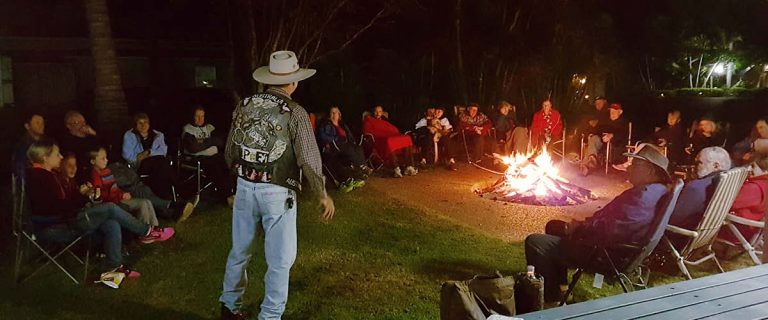


1 Comment
Check out the new Australian Poetry Hall of Fame in Guyra